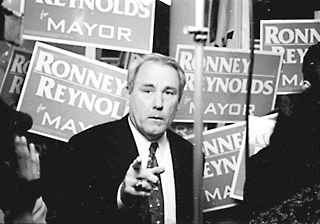Mayor: What, Me Negative?
Election '97 Coverage
Fri., May 9, 1997
|
|
It was shortly after 10am last Monday at the Chambers when Councilmember Ronney Reynolds shocked the city and officially withdrew from the mayoral run-off, raising the white flag to political newcomer Kirk Watson.
"This decision was not easy. It was real ... real hard," said the Austin native, his face in the glare of the TV spotlights while he tried to dam his tears by nervously shaking his leg. He bit his lip and his voice faltered. "It was hard."
But it wasn't hard to read the cards after last Saturday's first-round election; if Reynolds had continued, he would have no doubt been hung out to dry in the outposts of humiliation. The expected neck-and-neck finish became a Watson rout early on. As results streamed in through the night, trial attorney Watson flirted with the 50% threshold needed for a first-round knockout. He would have gotten it but for that pesky Max Nofziger, who stole enough of the liberal-enviro vote to force a run-off. Still, Watson finished with a very comfortable lead -- 48.5% to Reynolds' 39.9%, a difference of more than 5,000 votes. In addition, the nine percentage points that Nofziger won were guaranteed Watson property in the run-off. Moreover, with Reynolds' defeat seemingly inevitable, the underdog would have been at great odds to draw sufficient money from even his most faithful developer support. "Ronney simply didn't want to be embarrassed," says longtime political consultant Peck Young, of Emory & Young, who worked on neither campaign. "Though I'll give him credit. In this business it sometimes takes a lot more guts to quit than to run."
Others are similarly not ready to pat Reynolds on the back for refusing to "go negative" as he put it. "The fact is, [Reynolds] went negative, and it didn't work," says S.O.S. Alliance executive director Brigid Shea.
Specifically, Shea is referring to the attack TV commercials Reynolds ran that hammered on the fact that Watson alligned himself with former councilmember Shea. "What was his vision? Vote for me because I don't like Brigid Shea?'"
Reynolds' consultant David Weeks of Weeks, Correa, explains that the campaign had to go on the offensive to bolster Reynolds' deteriorating base. "Watson was making inroads and we had to stop the leak. That's why we ran comparison-type ads the last week," Weeks says. "When Brigid Shea was on the council she was one of the folks who contributed to gridlock, and we wanted to remind people that that was who Watson associated himself with."
Watson's media consultant Dean Rindy says that Reynolds' attack was a pathetic attempt to circle the wagons on a losing campaign. The effort to blame Watson's environmental cronies, including Shea, for causing Austin's traffic woes backfired. "Voters wanted vision and Ronney gave them a cloud of bus fumes," Rindy says, referring to Reynolds' bash Capitol Metro campaign theme. Pre-race polling suggested that traffic was a top concern among voters, but Rindy faults Reynolds' campaign for obsessing about the quarter of a cent sales tax rollback proposal.
Weeks counters that Reynolds did have a message -- that he was an experienced, proven leader, and that the Capitol Metro issue would have gotten better play if Reynolds had succeeded in getting a Cap Met referendum on the ballot. (Remember how the domestic partners' benefits issue in 1994 brought out the conservatives in droves, helping Reynolds beat enviro Mary Arnolds without a runoff?) Ahh, but that pesky liberal council voted down Reynolds' proposal, and there was nothing left to excite voters but Reynolds himself. A daunting task. Finally, Watson's role as an outsider was just too popular to combat. "It did worry us that Watson was chipping away at the middle and right," Weeks says. "There's a feeling of change out there." There's change all right. After the June 15 swearing in, the personal injury lawyer -- who never had to face the scrutiny of a bloody runoff -- will play a huge part in determining the future of our city. And people are scared.
Rightly so, admits Watson's own consultant David Butts. "Those in the environmental/progressive community are wary, and they have every right to be," he says. " Watson will have to prove he is who he says he is."
Butts notes that if liberals expect Watson to "go in and say `Death to developers,' they will be dissappointed.... He's from our side of the street, but Watson's not some sort of rigid ideologist.... But I am absolutely comfortable in saying that he will not roll over for developers." Of course, Butts was paid to say that.
Got something to say on the subject? Send a letter to the editor.







